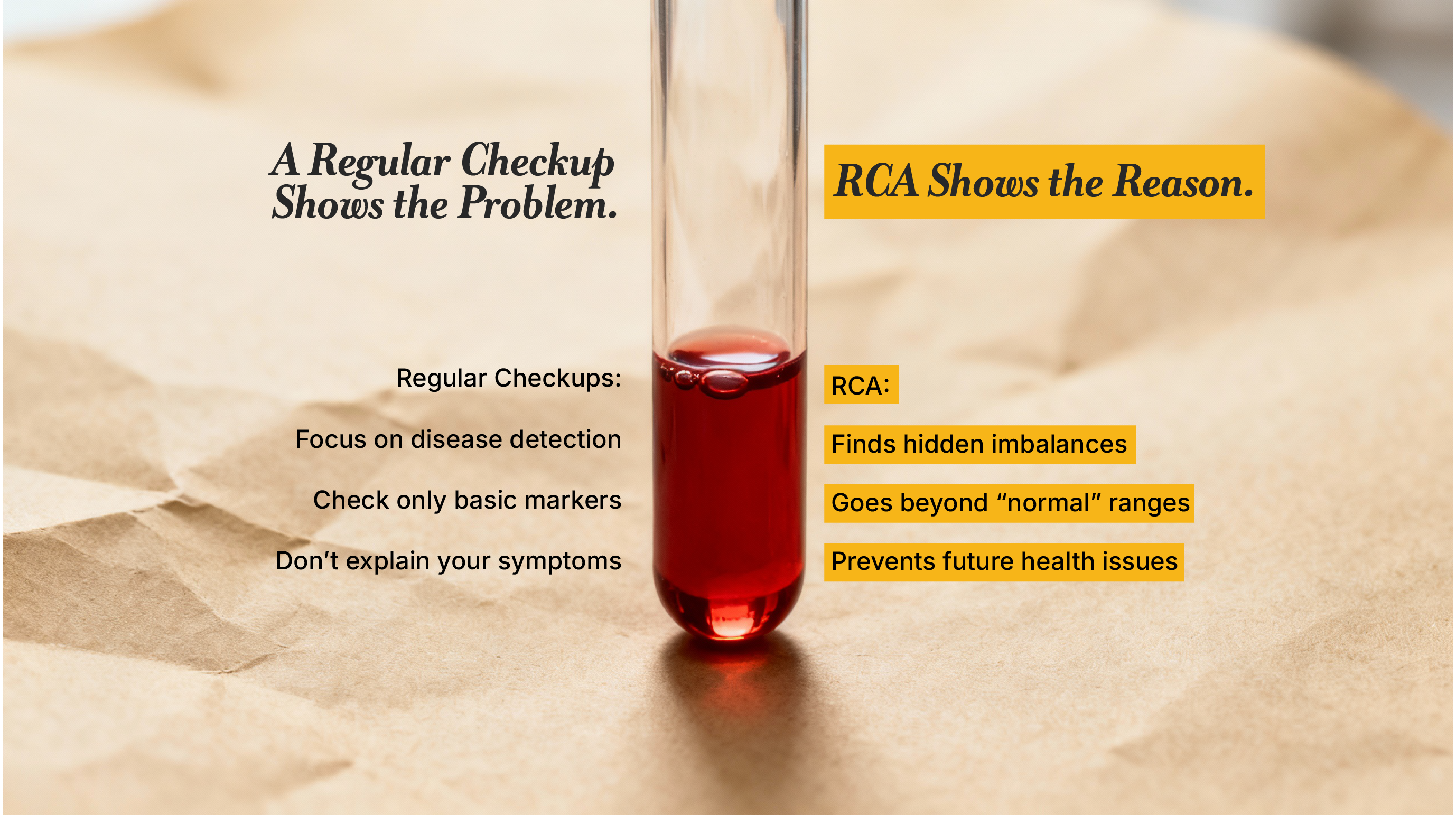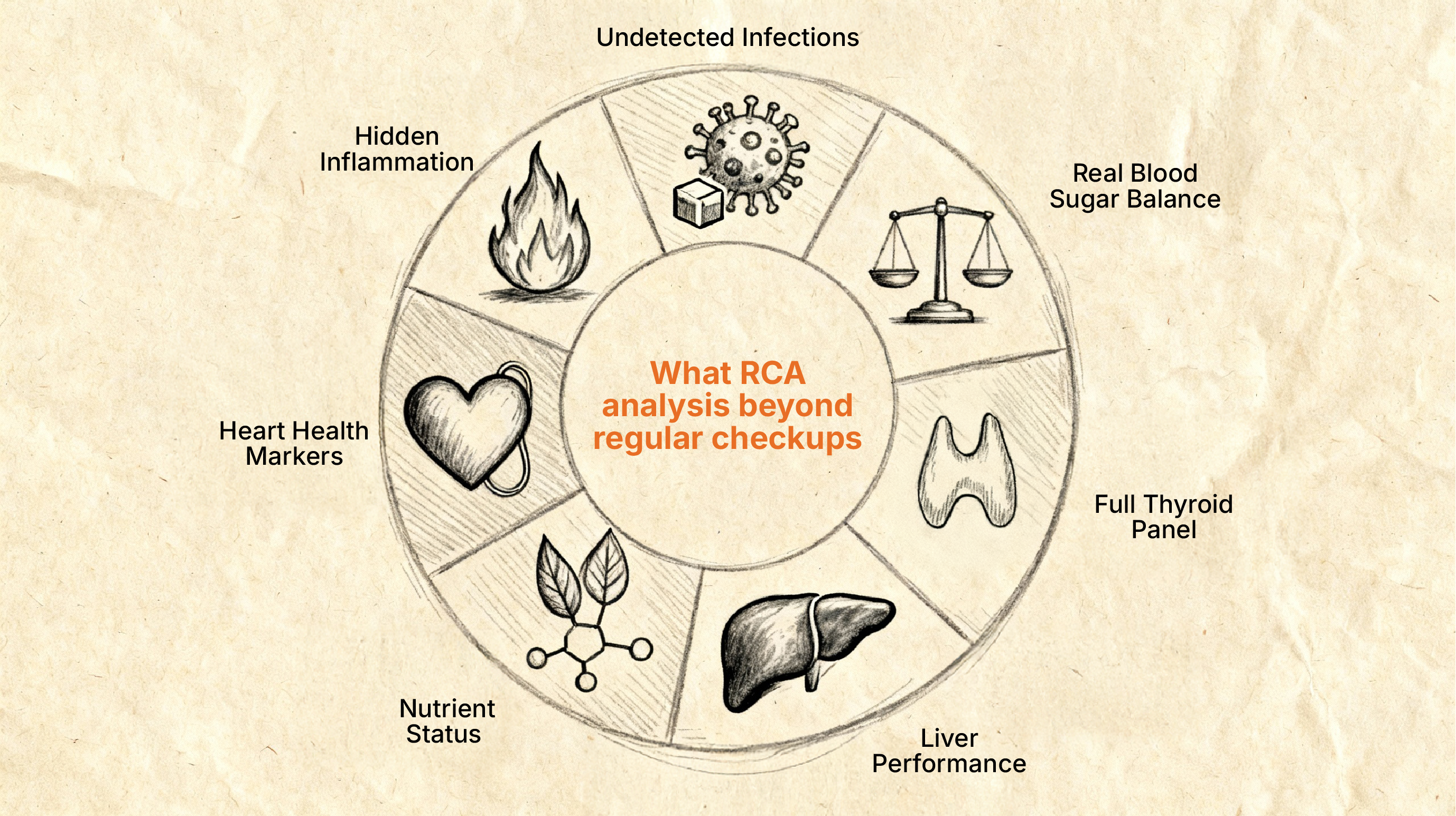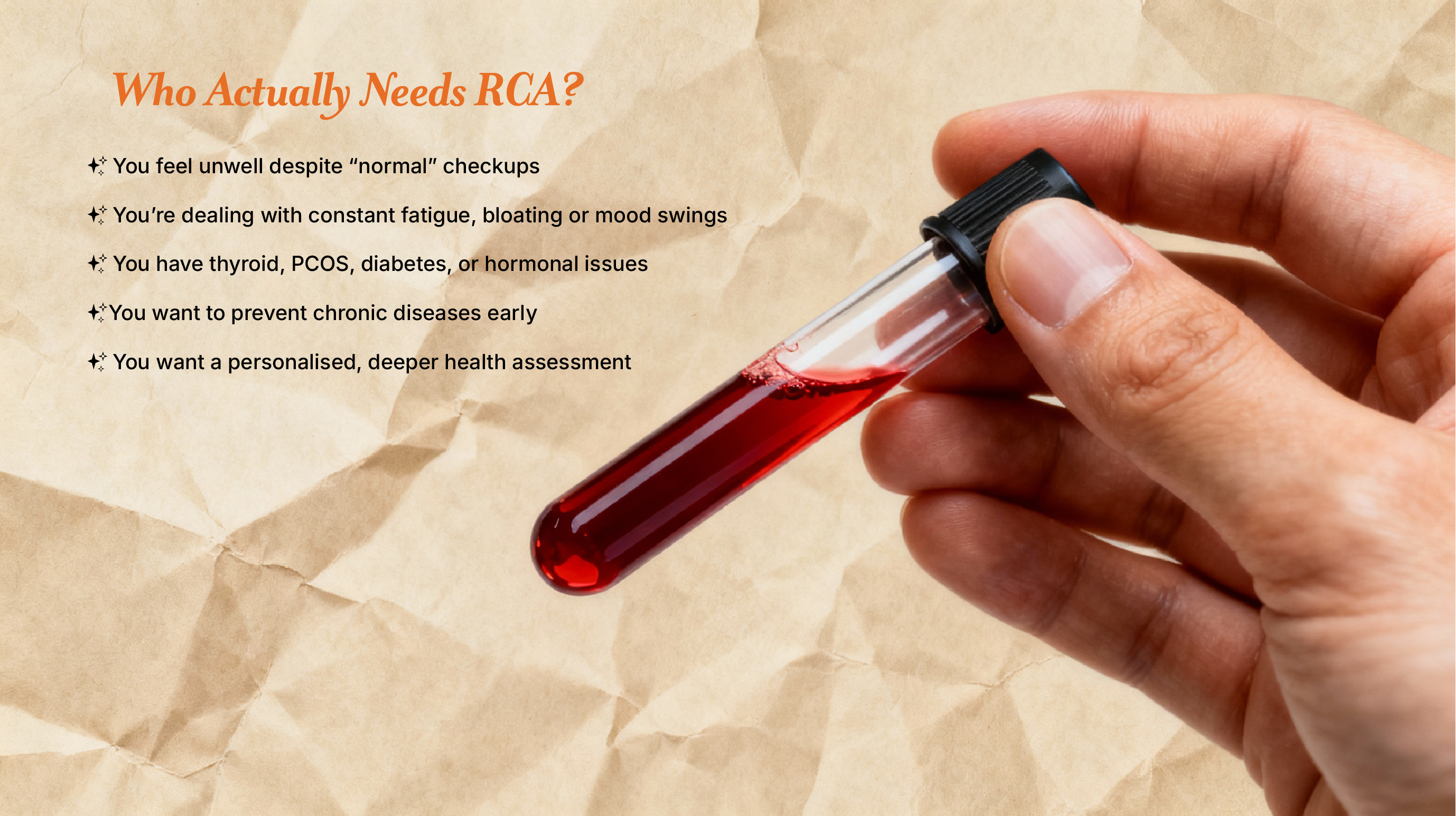Have you ever gone for a regular health checkup, received the reports, and been told everything is “normal,” yet you still feel tired, bloated, or unwell? Many people face this confusion. Their symptoms are real, but conventional reports do not reveal the underlying issues.
This happens because regular health checkups are designed to detect diseases, not to explore why your body is struggling. To truly understand your health and prevent problems before they become serious, you need a deeper approach. This is where Root Cause Analysis (RCA) comes in. RCA identifies the underlying reasons for your symptoms and helps restore balance in your body.
Let’s explore the differences between RCA and regular checkups in a simple way.
1. Understanding the Goal
When it comes to understanding your health, both regular health checkups and Root Cause Analysis (RCA) serve important purposes, but their goals are very different.
A regular health checkup focuses mainly on detecting diseases or obvious abnormalities. It checks your vital parameters, basic blood markers, and organ functions to see if anything has already gone wrong. However, it doesn’t go deeper to find why certain symptoms are appearing or what is causing those changes in your body. In short, it tells you what’s wrong, but not why it’s happening.
An RCA health assessment, on the other hand, goes much further. It takes a preventive and investigative approach by looking at how different systems in your body are working together. RCA in healthcare doesn’t just look for disease, it looks for imbalances and early warning signs that can lead to disease later. It helps you understand the root cause of your health issues before they become serious.
For instance, if your blood sugar is slightly high, a regular checkup might simply mark it as “normal” since it hasn’t crossed the diabetic range. But an RCA health check will dig deeper to understand why it’s rising, whether it’s due to stress hormones, infection and inflammatory markers, or nutrient deficiencies, and help you correct it before it becomes a chronic problem.
That’s the key difference between RCA and regular checkups. While a regular health screening provides a surface-level snapshot of your current state, a root cause health check gives you a detailed map of what’s happening beneath the surface.

2. What Is Analysed in Regular Checkups vs RCA
Regular Health Checkups Analysis
When you visit a doctor with a symptom, for example, stomach pain, a regular health checkup usually focuses only on that one problem area. The doctor might ask what you ate last night, prescribe some medicines for acidity or gas, and send you home.
In most cases, only the immediate symptom is addressed, not the reason behind it. The pain may go away temporarily after taking medicines, but once you stop them, it often returns. This happens because regular health checkups do not go deep enough to find the root cause of your discomfort.
Typically, a regular health screening will measure:
- Your body temperature
- Blood pressure
- Heart rate
- Weight
- And maybe a few basic blood parameters like hemoglobin, thyroid , cholesterol fasting and hba1c sugar
While these are important, they only show a small part of your health story. You might still feel unwell even if everything looks “normal” on paper.
What Is Analysed in RCA
An RCA health assessment goes much deeper. It analyses 55+ parameters to understand how your body is functioning as a whole. Instead of just focusing on symptoms, it uncovers the root cause of why those symptoms are happening.
Here’s what is analysed in RCA:
1. Nutrient Status
Regular health checkups only focus on whether your vitamin and mineral levels fall within a broad “normal” range. RCA digs deeper into key nutrients like Vitamin D, B12, iron, magnesium, zinc and folate to understand how your body is actually functioning. Even slight deficiencies can lead to fatigue, hair fall, low mood, weak immunity or hormonal imbalance before they show up as a disease. RCA helps catch these imbalances early so you can correct them before they affect your health.
2. Inflammation Markers
In a routine checkup, inflammation is usually not tested unless you're in visible pain or have an active condition. RCA checks markers like HS-CRP and ESR to detect hidden, chronic inflammation that may be silently damaging your body. This type of inflammation is often linked to weight gain, insulin resistance, joint pain, heart risk and autoimmune issues. Catching it early helps prevent long-term disease.
3. Hidden Infections
If you go to a doctor with stomach pain or fatigue, you're often given medicines without checking what’s actually causing it. RCA looks beyond symptoms and identifies patterns linked to underlying infections such as H. pylori, candida, EBV, parasites or UTIs. These infections don’t always show up in basic tests but can cause acidity, bloating, low energy, acne or poor immunity for years if not addressed.
4. Blood Sugar Balance
A regular checkup usually stops at fasting or random blood sugar levels. RCA evaluates parameters like insulin, HbA1c and signs of insulin resistance to understand how your body is managing sugar over time. You may not be diabetic, but you could already be experiencing early imbalance leading to weight gain, cravings, brain fog or energy crashes. RCA helps you correct it before it becomes a bigger issue like diabetes.
5. Heart & Cholesterol Health
Instead of only checking HDL and LDL like a normal test, RCA examines a complete heart health picture. Many people are told their cholesterol is “okay” when deeper markers show hidden stress. RCA gives a more accurate idea of heart health so you can take preventive steps.
6. Kidney Function
Basic tests only look at creatinine, which changes when damage has already started. RCA goes further by analyzing BUN, eGFR, uric acid and electrolyte balance to detect early kidney stress. This helps catch toxin buildup, mineral imbalance and dehydration-related strain before it turns into a chronic kidney issue.
7. Liver Performance
The liver doesn’t just process food, but it also regulates hormones, detoxifies the body and supports digestion. Regular checkups rarely interpret liver function deeply. RCA examines markers like SGOT, SGPT, GGT and bilirubin to detect toxin overload or sluggish detox. Early detection can prevent fatigue, acne, migraines, skin issues and metabolic slowdown.
8. Thyroid Health
Most doctors only test TSH and assume everything is fine if it falls within the range. RCA analyses the full thyroid panel, including Free T3, Free T4, and antibodies to uncover conversion issues, autoimmunity or early thyroid decline. This gives answers to symptoms like weight gain, hair loss, mood swings and low energy that regular tests often ignore.

3. How Results Are Interpreted
One of the biggest differences between Root Cause Analysis (RCA) and regular health checkups is how your reports are understood.
In Regular Health Checkups
In regular health checkups, your reports are compared to reference ranges. These ranges are based on the average population, not on what is truly healthy. The problem is that a large part of this “normal” population already has hidden health issues. So even if you feel tired, bloated, low on energy, moody, or unwell, your reports may still be considered “fine.” This approach mainly focuses on detecting disease after it develops, not on finding the root cause of why your body is struggling.
In Root Cause Analysis (RCA)
In Root Cause Analysis (RCA), your results are interpreted using optimal ranges, not just basic normal ranges. These ranges are narrower and based on what supports real health, energy, and prevention and not just the absence of disease. Even slight imbalances are taken seriously because they can explain symptoms like fatigue, hair fall, weight gain, brain fog, poor digestion, or mood changes. Instead of waiting for a condition to worsen, RCA focuses on early detection and addressing the root cause before it turns into a long-term problem.
When You Should Do RCA (Root Cause Analysis)
Root Cause Analysis is not only for people with a diagnosed disease. It is for anyone who wants deeper answers and long-term solutions instead of temporary symptom relief. Even if you don’t have any health issues, you can get it done to understand your overall health status and prevent future imbalances.
If you relate to any of these situations, an RCA health assessment can give you the clarity and direction that regular checkups often miss.

Conclusion
At iThrive, we specialise in Root Cause Analysis to help you finally understand what your body is trying to tell you. If you're dealing with symptoms, feeling stuck despite normal reports, or simply want to take preventive action, this is the right time to begin.
If you're struggling with chronic conditions like IBS, thyroid disorders, PCOS, diabetes, fatty liver, autoimmune issues, hormonal imbalance, skin problems, anxiety, or constant fatigue, a regular checkup may not give you the answers you need. At iThrive, we use a personalised approach to understand what’s really happening inside your body and create customised plans through nutrition, lifestyle changes, supplementation, and targeted healing strategies. You don’t have to live with recurring symptoms or temporary fixes.
Subscribe to our newsletter and receive a selection of cool articles every week





.png)


.webp)

.jpg)
.jpg)










